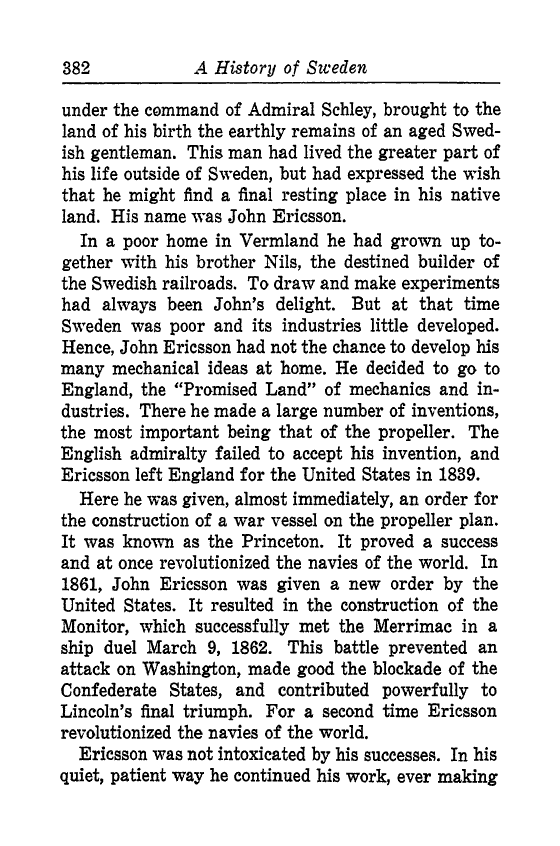
Full resolution (TIFF) - On this page / på denna sida - XXIV. Art and Science - C. Science, Invention, and Discovery

<< prev. page << föreg. sida << >> nästa sida >> next page >>
Below is the raw OCR text
from the above scanned image.
Do you see an error? Proofread the page now!
Här nedan syns maskintolkade texten från faksimilbilden ovan.
Ser du något fel? Korrekturläs sidan nu!
This page has never been proofread. / Denna sida har aldrig korrekturlästs.
382 A History of Sweden
under the command of Admiral Schley, brought to the
land of his birth the earthly remains of an aged Swed-
ish gentleman. This man had lived the greater part of
his life outside of Sweden, but had expressed the wish
that he might find a final resting place in his native
land. His name was John Ericsson.
In a poor home in Vermland he had grown up to-
gether with his brother Nils, the destined builder of
the Swedish railroads. To draw and make experiments
had always been John’s delight. But at that time
Sweden was poor and its industries little developed.
Hence, John Ericsson had not the chance to develop his
many mechanical ideas at home. He decided to go to
England, the "Promised Land" of mechanics and in-
dustries. There he made a large number of inventions,
the most important being that of the propeller. The
English admiralty failed to accept his invention, and
Ericsson left England for the United States in 1839.
Here he was given, almost immediately, an order for
the construction of a war vessel on the propeller plan.
It was known as the Princeton. It proved a success
and at once revolutionized the navies of the world. In
1861, John Ericsson was given a new order by the
United States. It resulted in the construction of the
Monitor, which successfully met the Merrimac in a
ship duel March 9, 1862. This battle prevented an
attack on Washington, made good the blockade of the
Confederate States, and contributed powerfully to
Lincoln’s final triumph. For a second time Ericsson
revolutionized the navies of the world.
Ericsson was not intoxicated by his successes. In his
quiet, patient way he continued his work, ever making
<< prev. page << föreg. sida << >> nästa sida >> next page >>